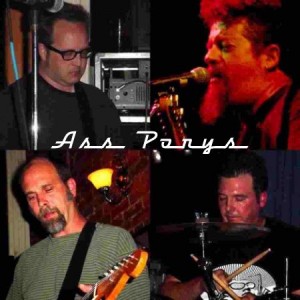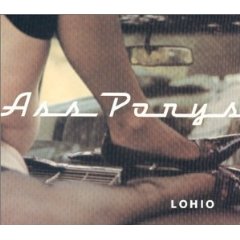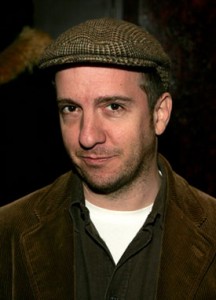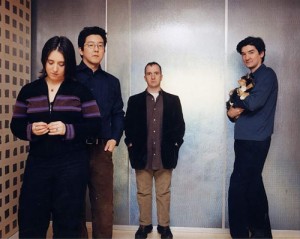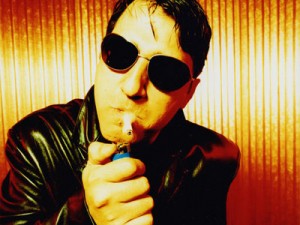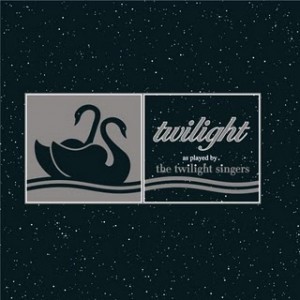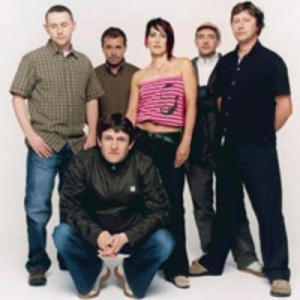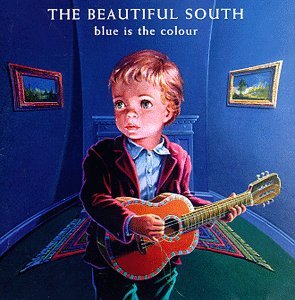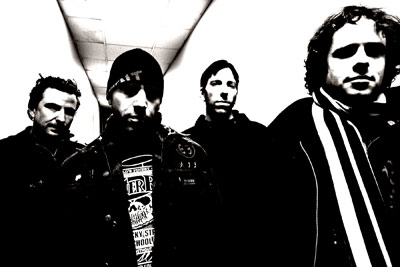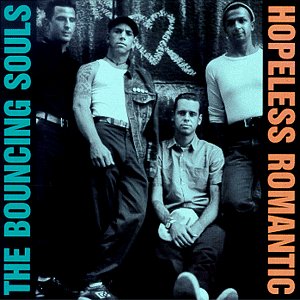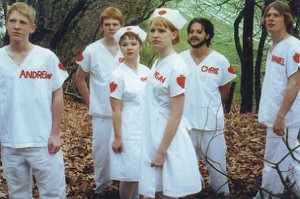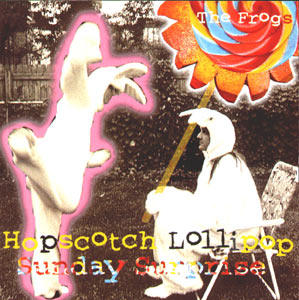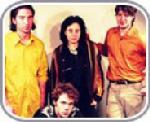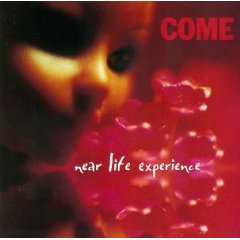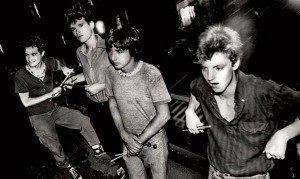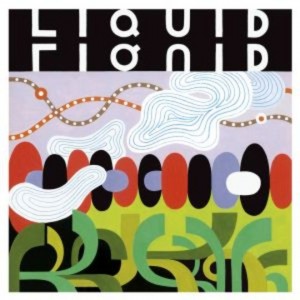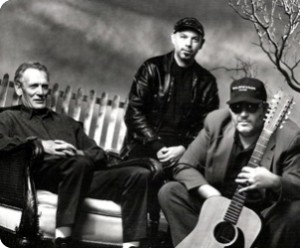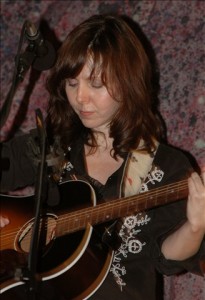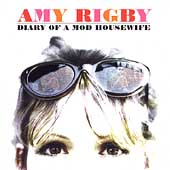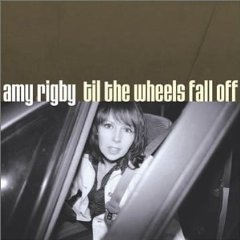FOREWORD: Latin Playboys were an excellent side project merging two Los Lobos members with a duo of heralded soundboard session men. Both albums they released in the ‘90s are well worth investigating. This article originally appeared in Aquarian Weekly.
Los Lobos guitarist David Hidalgo and percussionist Louie Perez teamed up with their producer/ sound manipulator Mitch Froom and engineer-bassist Tchad Blake to explore experimental ethnic music as the Latin Playboys in ‘94. Their second album, Dose, a brave belated follow-up to its eponymous debut, hearkens back to simpler times. It goes South of the Border on several festive Mexican-rooted dance mutations and returns to East L.A. for a few delightful Latin-tinged Chicano rockers.
Along with a new Los Lobos album (including, of course, Cesar Rosas, whose solo debut, Soul Disguise, recently dropped, the Latin Playboys have been busy with a few worthy side projects since ’98. Hidalgo and Rosas hooked up with veteran Tex-Mex icons Freddy Fender, Joe Ely, and Flaco Jiminez as Los Super Seven and received a Grammy nomination. Mitch Froom made his solo debut with Dopamine,and Hidalgo just released a duo set with Canned Heat multi-instrumentalist Mike Halby under the guise of Houndog.
With occasional assistance from singer-violinist Lisa Germano (the opening act on an American tour), the Latin Playboys pleased an eager Tramps audience in Manhattan that knew no generational boundaries in April. A few days after enjoying their exhilaratingly warm and heavily percussive set, I spoke candidly with Perez and Froom.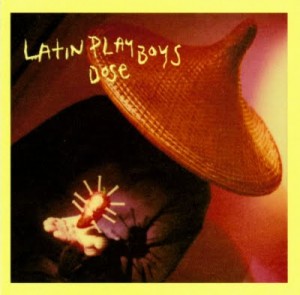
Does Dose pick up where the self-titled debut left off?
FROOM: There’s no agenda. We do what we like. I’ve known the guys in Los Lobos since their first single, “Will The Wolf Survive?”
How’d you initially get to do production work for Los Lobos?
FROOM: I think the record company suggested we get together.
After Los Lobos received mass appeal with the La Bamba soundtrack, the Kiko and Colossal Head albums were experimental sets that didn’t gain commercial radio exposure. Was it difficult to have a smaller audience again?
PEREZ: It took awhile for people to get over it. La Bamba threw us off quite a bit. We even did a Mexican folkloric album, La Pistola y el Corazon, which threw a wrench in the works. We had to derail La Bamba somehow. Mitch and Tchad came in the studio. Dave and I set some time aside, and we were ready to go into the Latin Playboys phase.
As a kid, what kind of music affected you most?
FROOM: There were several records that had a huge impact on me. One was Miles Davis’ Sketches Of Spain and another was The Genius Of Ray Charles. Then I completely fell for the Beach Boys and Beatles pop music. Then, the whole psychedelic phase hooked me. Also, I have a real strong emotional reaction to Gil Evans’ cool Jazz arrangements.
PEREZ: I grew up in a Mexican-American working class area listening to the music that was around the house like ethnic Mexican music which was popular in East L.A.
A lot of Latin Playboys songs are working class based.
PEREZ: Yeah. I started writing a bunch of stuff when I heard the music Dave gave me. I found myself inspired by the music’s visually arresting images. It made me revisit where I grew up as a kid. This album really gave me the opportunity to make these day-to-day sketches. It’s not about oppression or being Mexican-American in any social context or glorifying anything. It’s about everyday people.
Would you like to exploit the Rock En Espanol audience?
PEREZ: I can see our music crossing over into that market. There’s been a cross-collateralization which has been recently taking place. The edges are getting fuzzy. I don’t like this compartmentalizing of stuff. I think that audiences can find real cool things In the Latin Playboys.
Do you like the fact more bands are exploring multi-ethnic music?
FROOM: There’s a band called the Roots that blend elements well. The people interested in bringing a hybrid mentality to their music I like better than those who are appropriating music and figuring out how to sing over the top of it or just doing a bad version of something. The Latin Playboys various ethnic influences have depth to them. It’s hybrid music, but with a firm understanding.
“Ironsides” seems to capture the essence of the Latin Playboys best.
PEREZ: It started with a traditional rhythm and cranks up like an electric band, which is similar to border music, using whatever instruments are available. It reminded me of listening to Mexican radio coming from a little speaker from a pickup truck. And I ran with that idea.
FROOM: “Ironsides’ is one of my favorites because of its general concept. There’s a band coming out of one speaker, a truck coming out of the other speaker, and Louie’s doing the voices of a family going to the movies, without changing inflection. Sometimes our sounds aren’t overly reverberant, but there’s contrast.
Where’s the idea for “Cuca’s Blues” come from?
PEREZ: Cuca’s a common woman’s name. I drew this little picture of some woman who might be someone’s grandma revisited when she was young. It’s a time capsule of Los Angeles when it was still very young in the ‘30s. A red trolley car connected downtown with East L.A. Lots of Mexican people were crossing the river. There’s some mysterious things that may have happened in her life that the lyrics don’t really resolve – which is cool.
Is there currently a vibrant Latin music scene in L.A.?
PEREZ: When I was growing up in the ‘60s, there was a whole scene happening with the Midniters, Blondells, and the Premiers. They used to wear uniforms, blazers, and turtlenecks. The East L.A. sound was Mexican-Americans’ version of R & B. Then it went away. Maybe it was because of Viet Nam War. A lot of musicians were gone. Then disco took over and whatever musicians were left got day jobs and had kids. Then Los Lobos started doing things in the late ‘70s. We expected bands to follow through, but it didn’t happen. For years, we’ve been the only East L.A. band that’s gone this far. Finally, the scene has been picking up for Latinos in general. There’s a group, Ozomatli, that has an unusual blend. There’s an Asian, a black rapper. My son’s group, Villains, are recording now. I’m not just about being Latin. They’re taking in a lot of influences while retaining cultural integrity.
